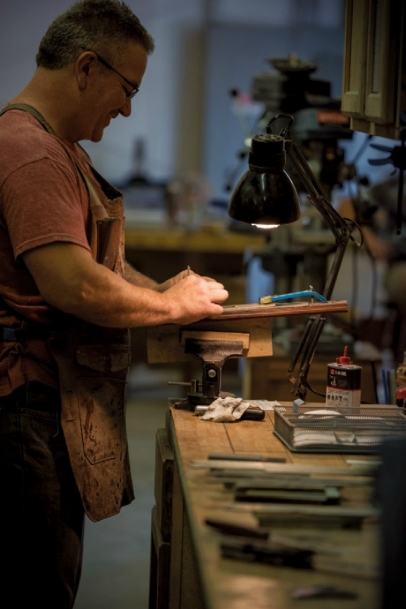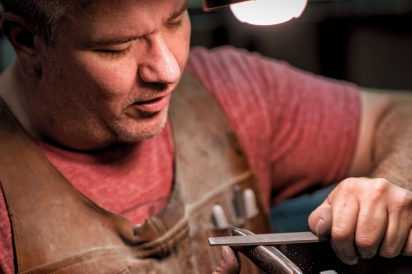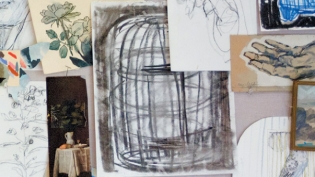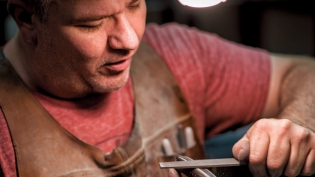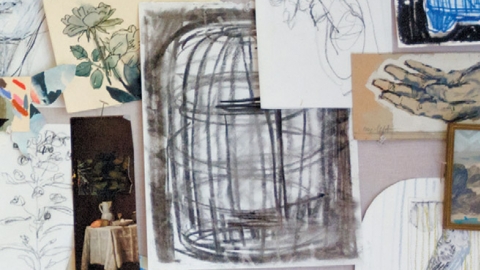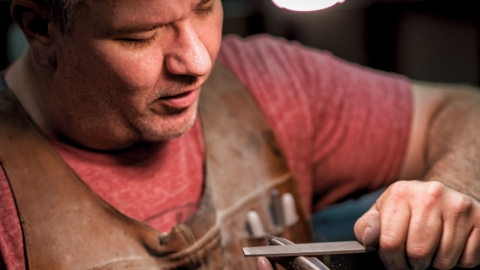Artists Who Cook: The Blacksmith
Fire, smoke, sharp pointy things—these are the inspirations for local knife maker Dan Eastland of Dogwood Custom Knives.
How, you might wonder, does one become a blacksmith? “As strange as it sounds, I got into knife making because of citronella torches,” Dan explains. “Living in north Georgia, mosquito control is necessary. The basic torch stands seemed to have a good design, but it annoyed me how disposable they were. They never last more than a season. So I found a blacksmith shop, set down the cheap bamboo holder and worked with the blacksmith to come up with a lasting design.”
While at the shop, Dan watched other blacksmiths pounding rough metal into knives. Watching the metal give to heat, bend and become something new, Dan was hooked. He hounded a local blacksmith, swept shop floors, and ran errands, working to convince them he was serious about learning the trade.
From the onset, he was told it would take no less than nine months of full-time apprenticeship to learn the skills needed to make a simple knife. “So I’d drop my boys off at school, drive to the shop, work all day, and be there for car line at the end of the day.”
Dan is the primary caregiver and cook of his family, something born out of necessity. His first son was born premature, and for the first months of his life required hourly feeding and around-the-clock care. Dan set aside his engineering degree to stay at home while his wife returned to work. “It was the easiest decision I ever made,” he says, but the task was grueling.
During the first few months of constant baby care, the kitchen became the young father’s creative outlet. “We weren’t going out to eat anymore, so I taught myself how to cook by working through the Joy of Cooking. I realized I really enjoyed the barely controlled chaos and room for interpretation found in cooking.” Soon he was packing up his thriving baby for trips to grocery stores and farmers markets, exploring flavors and ingredients together. With that enjoyment came the desire for really good tools. And then came the citronella torches, followed soon by his first handmade Bowie knife. After months of apprenticeship, training, and testing, he’d developed a chef’s knife that he wanted to take beyond just his personal use; he aspired to meet the standards of a professional kitchen.
He’d send mockups to a sous chef friend in Atlanta. “They’d use it, pass it around, and after a few months, I’d get it back in the mail covered in Sharpie with notes like ‘change this,’ ‘this is good—keep this.’”
Time passed, and once a knife didn’t return. Curious, he called up the Atlanta restaurant. “Hey, where's that prototype I sent? Did it get lost in the mail?”
His friend feigned surprise, “You mean my knife?” After two years of work and craft and testing, that’s the moment Dan knew he had his chef’s knife design.
These knives are not simple kitchen tools to chop onions and slice meat—the handmade blades coming out of Dan’s shop are works of restrained simplicity: a testimony to functional art and design. The balance, the handles, the finish are all handcrafted not only to be beautiful but also to perform. And because each knife is handmade by Dan in his small workshop outside of Greer, there are constant tweaks and improvements to the look and feel of each creation.
His research recently took him far from the Upstate, deep into the Amazon. There he worked with a tribe native to the area that is what Dan calls “blade-dependent.” He explains, “They’re one of the only knife cultures left, relying on one simple machete to do everything from cooking, trailblazing, to furniture making.” On his last visit, he worked with tribe members to assemble a table: from cutting down the tree to shaping the legs and smoothing the top, all with one single knife.
These are the adventures and experiences that inspire him to continue to design and create heirloom pieces. “If one day a grandfather hands his grandson one of my knives and says, ‘My Dad gave me this knife when I was your age,’ then I will consider myself a success.”


